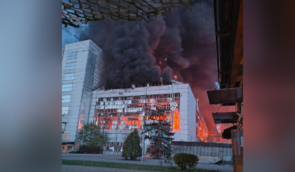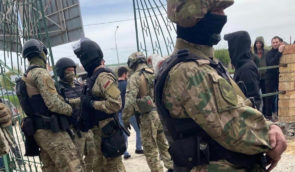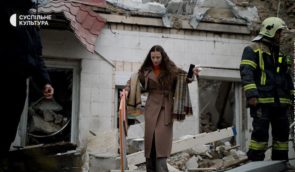Russia creates the illusion of development of the Crimean Tatar media in occupied Crimea
Russia creates the illusion of the development of the Crimean Tatar media in the occupied Crimea.
As reported by Tetyana Pechonchyk, Chair of the Board of the Human Rights Information Centre, during a conference in Kyiv on April 10.
“Russia creates parallel media, for example, the Millet TV channel, the Merab newspaper and other publications. But, according to observations of our monitors in Crimea, these mass media outlets are not popular among the Crimean Tatar people”, – she said.
“The so-called “media holding Ismail Gasprinsky” was created to oversee such mass media outlets”. The most interesting thing is that the task of this media holding was not the development of national media, not the reflection of the situation on the peninsula, not the popularization of the Crimean Tatar language, but control over the media. Importantly, the news department of the Millet TV channel is headed by a former employee of the Russia-1 TV channel”, – said Gayana Yuksel, Director of the QHA news agency.
She recalled the history of the Russian authorities pressuring the Crimean Tatar media.
“When the occupant invaded the island, he took control of all mass media outlet and most notably – Crimean Tatar media. The occupant started pressuring those mass media outlets, who refused to accept changes from the authorities”, – she said, adding that 12 national Crimean Tatar mass media outlets were fully functional before the occupation.
She said that the occupation authorities resorted to intimidation, threatening journalists and obstructing their activities on the ground.
“They called out editorial staff and said that they will search us. We will come to you. We will look into your writings”, – as Gayana Yuksel quoted the phone threats.
In the first days of the occupation, as early as April 2014, the de facto authorities blacklisted the QHA news agency. In such manner they forbade media reports to cover all official events on the peninsula.
After this, Moscow-controlled law enforcement agencies began pursuing the journalists, who are disloyal to the occupation.
“We were summoned and our materials from 2006 to 2010 were presented as an evidence of “offenses”. I was summoned for interrogation by the Center for Combating Extremism. They presented my own publications from 2006 about the organizations “Right Sector”, “Tryzub” (Trident), “Brotherhood of Stepan Bandera”, which are banned in Russia”, – recalls the director of the news agency.
Russian authorities refused to extend the licenses of the Crimean Tatar mass media outlets. Thus, for example, on 31 March 2015, radio station Meydan had ceased the broadcast and on the next day the Crimean Tatar TV Channel ATR has stopped broadcasting.
Gayana Yuksel outrages that the Russian authorities refused to re-register the female Crimean Tatar magazine Nenkendzhan. According to her, Russian authorities demanded from the editorial staff to translate the name Nenkendzhan.
“But this is absurd, because the names are not translated. Therefore, these projects changed to online publications”, – she said.
According to Tetyana Pechonchyk, Chair of the Board of the Human Rights Information Centre, over the last three years her public organization has recorded 460 cases of pressure against journalists and violations of freedom of speech on the peninsula. She states that the Russian authorities most systematically pursued the Crimean Tatar mass media outlets.
Gayana Yuksel regrets that due to forced departure from the peninsula a number of independent media are now working in isolation from the broadcasting area. Moreover, according to Tetyana Pechonchyk, access to these mass media outlets through internet is blocked in the Crimea.
“We checked at the end of March. News agencies Crimean news, 15 minutes, and ATR were still blocked in the Crimea”, – said Tetyana Pechonchyk.
Gayana Yuksel calls the thesis of Russia, which was voiced at the UN International Court of Justice in The Hague, saying that there are more than 80 Crimean Tatar and Ukrainian mass media outlets on the peninsula as untruthful.
“The number of national mass media outlets on the peninsula has sharply decreased. Nothing new was created to replace the old mass media outlets. They count the number of media outlets in the languages that the media indicate in the broadcast application”, – said the director of the news agency.
Tetyana Pechonchyk indicates that Russians are even trying to influence the content of social networks. As an example, she cited the closure of the group Crimean Tatars in the Odnoklasniki social network. About 15,000 people were participants of that group.
“Crimean Tatar activists often broadcast streams in social networks in order to break the informational ghetto. The Crimean Tatar streamers are already a phenomenon on the peninsula, but they are also pressured. For example, in February of this year, 10 Crimean Tatars were arrested for 5 days for coming to support their neighbor Marlen Mustafayev, whose house was searched by law enforcers”, – said the human rights defenders.
“For three hundred years the Crimean Tatar people are facing almost constant repressions. The mass media outlets of these people perform an enlightening role. When the Crimean Tatars were deprived of the opportunity to study their native language they studied it in newspapers and postcards. Crimean Tatar media also reported on the practice of Islam. These mass media outlets became a way for Crimean Tatars to identify themselves”, – explained Emine Dzheppar, First Deputy Minister of Information Policy of Ukraine.
She calls the content of the Moscow-monitored Crimean Tatar media as propagandistic and its goal – to split the Crimean Tatar people.
“Such mass media outlets carry out a discrediting campaign against the activists of the Crimean Tatar people in mainland Ukraine. The news feeds start from digging up dirt on the activists. The “wrong” policy of the Crimean Tatar leaders is constantly on the spotlight”, – said Emine Dzheppar.
She notes that Russian media are the image of Crimean Tatars as radical Islamists in the world. For this purpose, Russian journalists are using the “Hizb ut-Tahrir” case.
“Hizb ut-Tahrir was banned in Russia, but during the years of Ukraine’s independence there was not a single case of bloodshed or any clash on religious grounds in the Crimea. The work of this organization never threatened the national security of Ukraine, but this case was artificially drawn, people for this case were found and convicted. Russian mass media outlets constantly tell stories about Islamic fundamentalism and extremism, while artificially imposing these memes on Crimean Tatars”, – she explained.
“Thus, a new Crimean Tatar identity is presented to the world in which the Crimean Tatar people are presented not as tolerant people, as we are in fact and showed it during Ukraine’s independence, but as radical”, – she added.
Human rights defenders recommend for the Prosecutor’s Office of the Autonomous Republic of Crimea to initiate criminal proceedings and investigate attacks on the freedom of speech on the peninsula.
They also recommend for foreign countries to impose personal sanctions against people, who are involved in grave violations of freedom of speech. Tetyana Pechonchyk reminded that in March 2017 the Human Rights Information Centre, together with the Ministry of Information Policy, published a list of freedom of expression stranglers.
According to her, the de-occupation of the peninsula and the return of independent journalists to the Crimea can drastically change the situation with freedom of speech on the peninsula.
At the same time, experts urge international journalists to come to the occupied territory. Emine Dzheppar recalls that the Ministry of Information Policy and the State Migration Service as much as possible simplified the permission on entry to the Crimea for foreign journalists. Now this permission can be obtained in a few hours.







